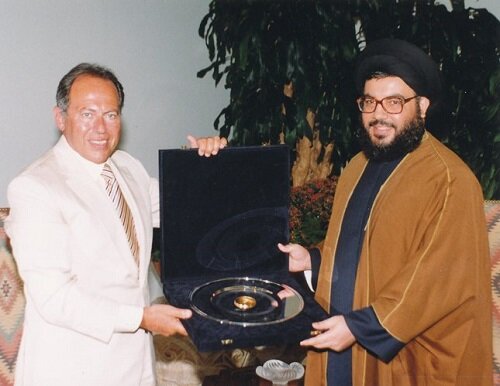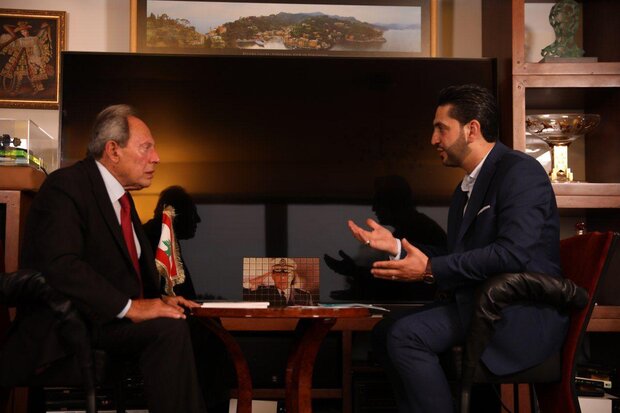Emile Lahoud is the 15th President of Lebanon from Nov. 24, 1998, to Nov. 23, 2007. He was born on January 12, 1936, in the town of Baabdat. He is the son of General Jamil Lahoud, who played a key role in establishing the Lebanese army and strived to achieve independence for the country.
In an interview with Mehr News Agency, Emile Lahoud discussed a number of regional and global issues. This is the second and final part. The first one was previously published on Monday.
What is your assessment of the latest events in Lebanon? Are there still efforts to destroy the weapons of The Resistance and Hezbollah in Lebanon? Especially since all the plans and scenarios for disarming the Resistance failed?
Since the beginning of 2005, when Rafiq Hariri was assassinated, I have only spoken to the media once a year, after the anniversary of Lebanon's independence, because I was the army commander at the time and was speaking on the anniversary of the army's feast.
Rafiq Hariri was a businessman and was always looking for making more profit. When I was commander of the army, he offered me half a million dollars a month to buy army officers, but I strongly opposed him. When I became president, he offered me the same thing again, but as someone who believed in the rights and interests of the Lebanese people and the importance of resistance to deter Israeli threats, I strongly opposed the offer. Due to my thorough familiarity with military affairs, I strongly opposed the merger law (Hezbollah's integration into the military), while the Lebanese authorities at the time insisted on doing so.
In 1993, I was the commander of the army, and I did not know Hafez al-Assad, the then president of Syria, and all Lebanese politicians opposed the merger of the army and complained to Hafez al-Assad. He further told them that Lahoud is right and that the merger should take place.
In 1993, when bombing Israel was planned, Rafik Hariri, Abu Jamal, al-Shahabi, and Ghazi al-Kanaan said that it was the right of the Lebanese government to get rid of Hezbollah. Hariri told me that the Lebanese Supreme Council of Defense was going to pass a resolution in order to terminate Hezbollah and that all I had to do was to hit (bomb) Hezbollah in the south.
My conscience would not allow me to bomb the Lebanese in their homes, and I demanded my resignation and told them to find someone else as commander of the army. Of course, I had predicted that they would not be able to pass the resolution in the Supreme Council of Defense. Despite this, they made their decision and informed me of the order to attack Hezbollah in southern Lebanon.

After the order was issued, as I entered my office, I saw a map prepared by the commander of the international forces for the destruction of Hezbollah. The commander of the international forces was affiliated with the intelligence service in which Jamil al-Sayyid and Michel Rahbani were playing a part in. I asked them to ignore the plan, but they refused, then I told them to look for another commander for the army.
The then foreign minister Farès Boueiz called and asked me to launch a missile attack on Hezbollah's positions. I told him I was no longer in the army. During a trip to Damascus, Jamil al-Sayyid met with Mohammed Nasif and informed Hafez al-Assad of this issue, which surprised him. It was later revealed that Abu Jamal, al-Shahabi, Ghazi Kanaan, together with Rafik al-Hariri had made the decision.
For the first time, Hafez al-Assad wanted to meet with me. At that time, if this decision was made, Hezbollah could only resist for 2 hours. I said this to show that Lebanon is built on a mountain of corruption and commercial profit. Here, I need to mention the election law in Lebanon. I consider the election law in Lebanon to be a purely Israeli because each of the foreign parties, including France, the United States, and Saudi Arabia, is working to secure Israel's consent to support their tribes in the Lebanese elections. I believe that the new election laws in Lebanon can save the country politically from the shackles of religious tribalism.
Can the government of Hassan al-Diab make a serious change? Given your political experience and knowledge of Lebanese political leaders, can the new prime minister implement these changes, especially since the region is undergoing new developments?
Hassan Diab is able to make changes, and he is an honorable man and follows a school that has taught us responsibility. It should be noted that the credentials of the cabinet ministers have been approved by Parliament, which has come to power on the basis of religious divisions. Most cabinet members are out of politics, and each has its own authority in parliament. Therefore, al-Diab had no choice but to make some concessions. In my opinion, Hassan al-Diab has done 100 times better than al-Hariri. If Hariri remained prime minister, things would certainly not have gotten any better.
In the tenth month of last year, when the entire Lebanese nation sought the survival of al-Hariri as prime minister, I explicitly stated that Hariri should leave because, due to his presence, the country's affairs would not improve. So I announced that he should be replaced by al-Diab whom I didn't know well at the time. However, after watching him closely for a while, I realized that he is a very good person and has taken the right path. I also stated that we must form an interim government to assume certain duties and responsibilities.
These tasks include monitoring individuals who have transferred their money out of Lebanon and whose assets must be transferred to Lebanese banks and the Lebanese economic cycle; the policy brings in $ 20 billion in foreign currency to the country. Unfortunately, they deny this today. Recently, Lebanese central bank governor Riad Salamé falsely claimed that there was no such amount, despite the $ 20 billion. Therefore, I believe that returning such money to Lebanon could solve the problem of the dollar or foreign currency in the country and reduce prices.

Today, decisions are being made in the Lebanese cabinet, but it is clear that cabinet members will not be able to prosecute the powerful corrupted individuals and punish them. It seems that today everyone is satisfied that we cannot provide the necessary foreign currency for our country; We have not borrowed money for seven months, and this is due to the fact that the Lebanese authorities have decided to use the deposited property instead of borrowing.
Here, I warn the government and the country's political rulers not to encroach upon people's property, because protecting this property is part of the people's sacred rights. If the government plays with this property, I will be the first to stand up to it. We did not allow Israel to take our rights, so how can we allow government officials to oppress the rights of the people with their corruption.
End of part 2 of the interview
Interview by Fadi Boudieh and Mehdi Azizi
MNA/ 4914767
























Your Comment